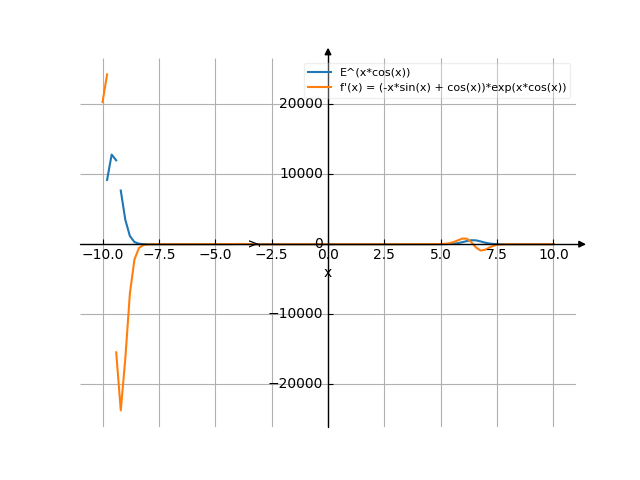Derivative of exp^(xcosx)
The solution
You have entered
[src]
x*cos(x) e
$$e^{x \cos{\left(x \right)}}$$
d / x*cos(x)\ --\e / dx
$$\frac{d}{d x} e^{x \cos{\left(x \right)}}$$
Detail solution
-
Let .
-
The derivative of is itself.
-
Then, apply the chain rule. Multiply by :
-
Apply the product rule:
; to find :
-
Apply the power rule: goes to
; to find :
-
The derivative of cosine is negative sine:
The result is:
-
The result of the chain rule is:
-
The answer is:
The first derivative
[src]
x*cos(x) (-x*sin(x) + cos(x))*e
$$\left(- x \sin{\left(x \right)} + \cos{\left(x \right)}\right) e^{x \cos{\left(x \right)}}$$
The second derivative
[src]
/ 2 \ x*cos(x) \(-cos(x) + x*sin(x)) - 2*sin(x) - x*cos(x)/*e
$$\left(- x \cos{\left(x \right)} + \left(x \sin{\left(x \right)} - \cos{\left(x \right)}\right)^{2} - 2 \sin{\left(x \right)}\right) e^{x \cos{\left(x \right)}}$$
The third derivative
[src]
/ 3 \ x*cos(x) \- (-cos(x) + x*sin(x)) - 3*cos(x) + x*sin(x) + 3*(-cos(x) + x*sin(x))*(2*sin(x) + x*cos(x))/*e
$$\left(- \left(x \sin{\left(x \right)} - \cos{\left(x \right)}\right)^{3} + x \sin{\left(x \right)} + 3 \left(x \sin{\left(x \right)} - \cos{\left(x \right)}\right) \left(x \cos{\left(x \right)} + 2 \sin{\left(x \right)}\right) - 3 \cos{\left(x \right)}\right) e^{x \cos{\left(x \right)}}$$
The graph


![Find the derivative of y' = f'(x) = exp^(xcosx) (exponent of to the power of (x co sinus of e of x)) - functions. Find the derivative of the function at the point. [THERE'S THE ANSWER!] exp^(xcosx)](/media/krcore-image-pods/176/hash/derivative/4/4a/6dd03ae665519d97b776253dcfd97.png)
 Derivative of x^2-7*x
Derivative of x^2-7*x
 Derivative of -sin2x
Derivative of -sin2x
 Derivative of e^(2*x)*cos(x)
Derivative of e^(2*x)*cos(x)
 Derivative of cos(x+2)
Derivative of cos(x+2)